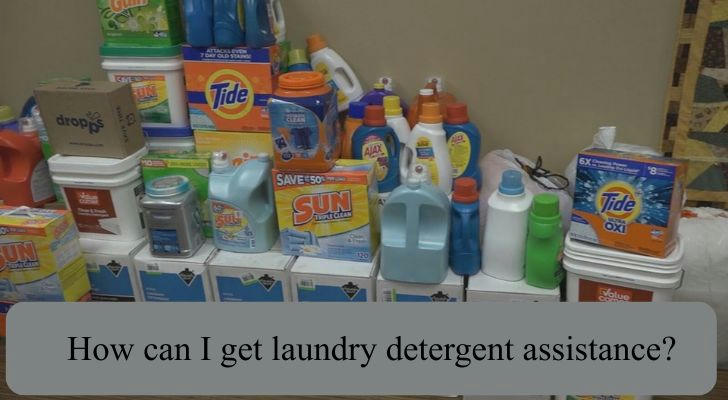Simple Ways to Access Laundry Detergent Assistance in the U.S.
Laundry detergent is a basic household need that supports hygiene and dignity. However, many low-income families and older adults often find it difficult to afford or access consistent supplies. This guide outlines how to obtain laundry detergent and hygiene products through public and community-based programs available across the United States.

🔍 Who Can Qualify and How to Apply
Several assistance programs across the country make it easier for households to receive laundry supplies. Applicants typically need to provide:
- Proof of address
- Basic income details
- Household information (if requested)
Organizations such as The Salvation Army and local community action centers often provide hygiene kits containing detergent and cleaning products. These programs usually prioritize households with limited income, seniors, or individuals in emergency situations.
👵 Laundry Support for Seniors and Aging Adults
Older adults often face unique barriers such as reduced mobility and fixed incomes, which can make regular laundry tasks challenging. Many initiatives now offer practical help designed for their needs:
- Home delivery of hygiene or laundry packages
- Community-based laundry pick-up services
- Mobile laundry units for neighborhoods
- Monthly kits from senior centers or food distribution sites
These resources help seniors maintain cleanliness, comfort, and independence while reducing physical effort.
🏢 Public and Nonprofit Assistance Programs
| Program | Description | Who It Helps |
|---|---|---|
| USDA TEFAP | Offers monthly food and hygiene product distributions, sometimes including laundry detergent | Low-income households and families |
| Community Food Banks | Distribute donated cleaning products and detergent | Families and individuals in need |
| The Salvation Army | Provides essential hygiene kits and laundry supplies through outreach programs | Local residents and vulnerable populations |
| Clean the World Foundation | Delivers recycled hygiene kits containing detergent, soap, and cleaning items | Low-income or underserved communities |
These organizations ensure that essential products reach those who need them most, often through regular community distribution points.
🏬 Brand and Retail Partnerships Supporting Access
Several detergent producers and major retailers contribute to national laundry assistance efforts through their community outreach activities:
- Tide Loads of Hope: Operates mobile laundry services for communities recovering from crises or financial hardship.
- Retail Collaborations: Supermarkets and department stores often partner with local charities to supply detergent and other home care essentials.
- Community Support Events: Many stores, including major chains, occasionally organize donation drives or distribute hygiene kits at community days.
These partnerships combine private resources with community engagement to expand the reach of laundry assistance.
🤝 Corporate and Local Partnerships Filling the Gap
Independent initiatives and nonprofit collaborations are playing a growing role in ensuring detergent accessibility:
- Laundry Help Network: Connects laundromats with low-income families through detergent credits and affordable wash cycles.
- Clean and Care Projects: Coordinate donations from hotels and manufacturers to redistribute essential cleaning products.
Such partnerships close gaps between social services and private contributions, ensuring consistent aid for those who need ongoing hygiene support.
👥 Benefits Across Age Groups
Laundry assistance programs provide distinct advantages for adults of different ages:
| Age Range | Key Benefits |
|---|---|
| 40–55 | Helps working adults balance household costs and time for laundry. |
| 56–65 | Reduces expenses for those nearing retirement and promotes personal hygiene. |
| 66–75 | Supports individuals with mobility challenges through delivery or transport assistance. |
| 76+ | Promotes independence and dignity through at-home or neighborhood-based support. |
By addressing the different challenges of each age group, these programs enhance hygiene, health, and convenience for all participants.
📝 How to Apply for Laundry Assistance and Maintain Benefits
- Search for local nonprofits, faith-based groups, or county social service offices that provide detergent support.
- Review program requirements and prepare necessary documentation (photo ID, address verification, household details).
- Submit applications or register early, especially for limited-distribution programs.
- Follow any usage guidelines to ensure fair distribution.
- Stay informed about renewal or reapplication periods to maintain ongoing eligibility.
Proactive communication with service providers ensures that households receive continuous support throughout the year.
🏁 Conclusion
Access to laundry detergent is an important part of maintaining health and dignity, particularly for seniors and families facing financial challenges. Across the U.S., various government agencies, nonprofits, and private initiatives are expanding opportunities for households to obtain detergent and hygiene products with ease. Explore available community programs to secure consistent support and improve daily living comfort.
